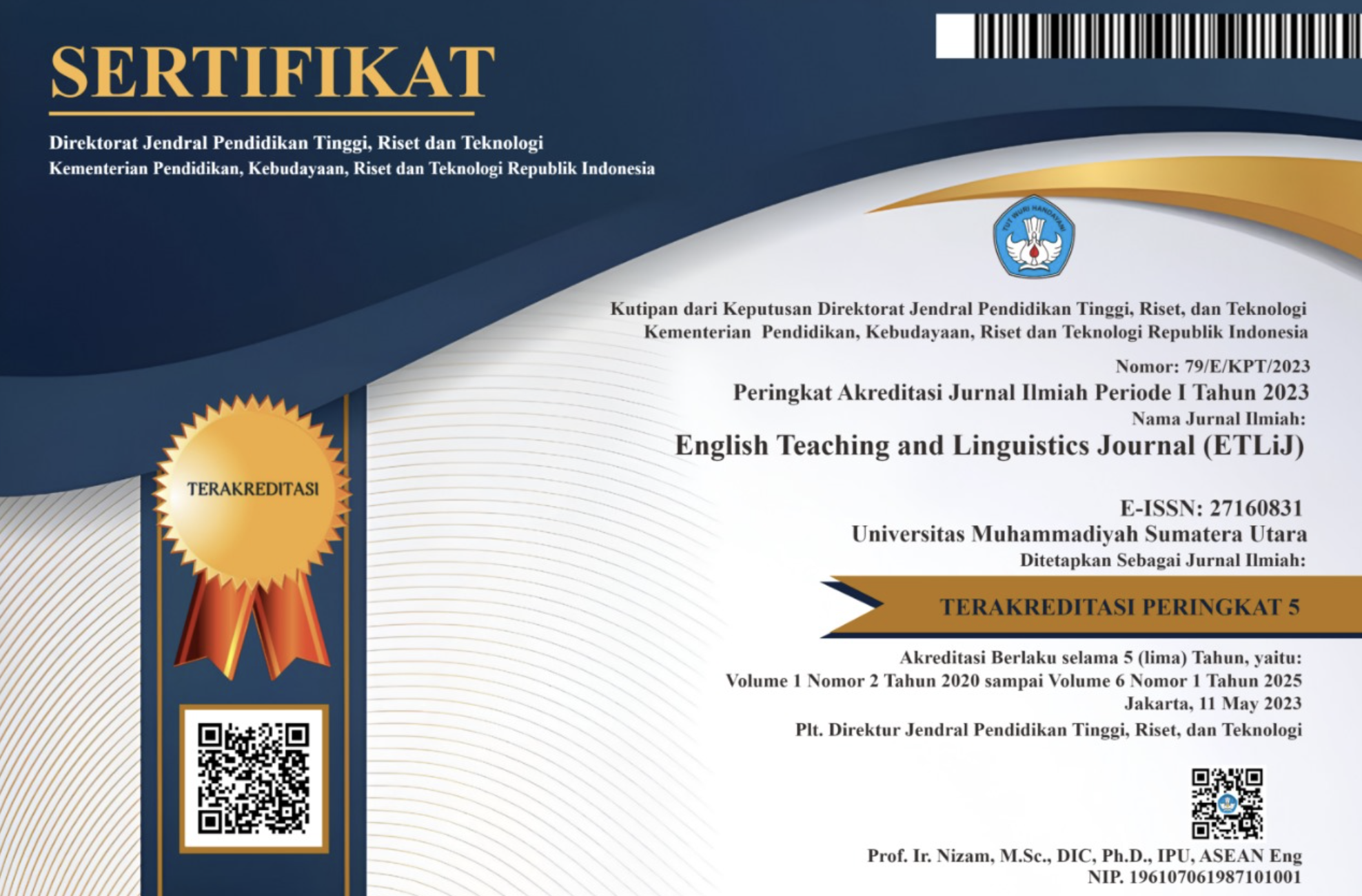Innovative Teaching Strategies in Teaching English as a Foreign Language
Abstract
This study aims to explain innovative teaching strategies in teaching English as a foreign language. This research was conducted by following the stages of library research. Data was collected from accredited national and international journals and analyzed qualitatively. From the data collected, it was found that the innovative learning strategy is student-centered. In the learning process, students play an active role in building their knowledge. In addition, the implementation of innovative strategies aims to prepare students to master the skills needed in the digital and global era. Innovative learning strategies are proven to provide various benefits in the language learning process. Learning strategies often implemented in learning English as a foreign language are cooperative learning, problem-based learning, and project-based learning. In terms of assessment, innovative learning uses authentic research to ensure students can implement the knowledge gained in real situations.
Keywords
Full Text:
PDFReferences
Affandi, A., & Sukyadi, D. (2016). Project-based learning and problem-based learning for EFL students writing achievement at the tertiary level. Rangsit Journal of Educational Studies, 3(1), 23-40.
Aghayani, B., & Hajmohammadi, E. (2019). Project-Based Learning: Promoting Efl Learners Writing Skills. LLT Journal: A Journal on Language and Language Teaching, 22(1), 78-85.
Alfares, N. (2017). Benefits and difficulties of learning in group work in EFL classes in Saudi Arabia. English Language Teaching, 10(7), 247-256.
Ampa, Andi & Nurqalbi, Nurqalbi. (2021). Innovative Learning Strategies to Increase Students Participation and Quality of English Teaching and Learning Process. Technium Social Sciences Journal. 26. 314-325. 10.47577/tssj.v26i1.5195.
Anil, B. (2017). Applying innovative teaching methods in a second language classroom. International journal of research in English education, 2(2), 1-9.
Ayuni, M., & Susanti, N. I. (2018). Problem Based Learning in Foreign Language Learner's (FLL) Grammar Class: How Will Students Perceive It?.
Bashith, A., & Amin, S. (2017). The effect of problem based learning on EFL students critical thinking skill and learning outcome. Al-Ta Lim Journal, 24(2), 93-102.
Bassendowski, S. L., & Petrucka, P. (2013). Are 20th-Century Methods of Teaching Applicable in the 21st century?. British Journal of Educational Technology, 44(4), 665-667.
Benson, R., & Brack, C. (2010). Online assessment. In R. Benson & C. B. T.-O. L. and A. in H. E. Brack (Eds.), Online Learning and Assessment in Higher Education (pp. 107153). Chandos Publishing. https://doi.org/https://doi.org/10.1016/B978-1-84334-577-0.50004-3
Boele, D. (1998). The Benefits of a Socratic Dialogue: Or: Which Results Can We Promise?. Inquiry: Critical thinking across the disciplines, 17(3), 48-70.
Borich, G. D. (2000). Effective Teaching Methods. Merril Prentice Hall: Upper Saddle River, New Jersey.
Boumov, V. (2008). Traditional vs. modern teaching methods: Advantages and disadvantages of each (Doctoral dissertation, Masarykova univerzita, Filozofick fakulta).
Burke, A. (2011). Group work: How to use groups effectively. Journal of Effective Teaching, 11(2), 87-95.
Cachia, R., Ferrari, A., Ala-Mutka, K., & Punie, Y. (2010). Creative learning and innovative teaching. Final report on the study on creativity and innovation in education in the EU member states.
Deli?, H., & Be?irovi?, S. (2016). Socratic method as an approach to teaching. European Researcher. Series A, (10), 511-517.
Desinguraj, Sumathi & Kumar, S. (2021). Innovative method of teaching in history -school level.
Espmarker, J., & Tedenby, E. (2020). Effective Teaching Methods and Strategies in the EFL Classroom to Facilitate Students Vocabulary Development.
Fals, I. (2018). An Analysis Of Efl Teachers Strategies In Teaching Speaking (Doctoral dissertation, Universitas Brawijaya).
Hayati, A., Afriani, Z., Akbarjono A. (2021). Teachers Teaching Strategies in EFL Class. Jadila: Journal of Development and Innovation in Language and Literature Education. 10.52690/jadila.v1i3.126
Hidayah, J., & Morganna, R. (2019). Fulfilling the needs of diverse students: teaching strategies for EFL inclusive classrooms. Suar Betang, 14(2), 183-195.
Husnu, M. (2018). Demonstration Technique to Improve Vocabulary and Grammar Element in Teaching Speaking at EFL Learners. English Language Teaching, 11(2), 26-30.
Intarapanich, C. (2013). Teaching methods, approaches and strategies found in EFL classrooms: A case study in Lao PDR. Procedia-Social and Behavioral Sciences, 88, 306-311.
Juneau, S., Sasseville, N., & Fortin, M. C. (2022). The Benefits of an Innovative Teaching Pedagogy Aimed at Combining Theory and Practice in Social Work. Journal of Teaching in Social Work, 42(5), 469-488.
Kiftiah, S. (2019). TEACHERS STRATEGIES IN GIVING EXPLANATION IN EFL CLASSROOM (Doctoral dissertation, Universitas Negeri Makassar).
Killen, Roy (1996), Effective Teaching Strategies (Lesson from Research and Practice). Australia: Social Science Press.
Knopf, J. W. (2006). Doing a literature review. PS: Political Science & Politics, 39(1), 127-132.
Kodriyah, L. (2017). Project-based learning in the classroom for EFL learners; why and how. In National
Kurniawati, S. (2022). The EFL Teachers' Perspective on the Implementation of Problem-Based Learning During the Pandemic Era. The Progress: Journal of Language and Ethnicity, 1(1), 37-54.
Mali, Y.,C., G. (2016). Project-Based Learning in Indonesian EFL Classrooms: from Theory to Practice. IJEE (Indonesian Journal of English Education), 3(1), 89-105. doi:10.15408/ijee.v3i1.2651
Moleong, L. J. (2018). Metodologi Penelitian Kualitatif [Qualitative Research Methodology]. PT Remaja Rosdakarya.
Naz, F., & Murad, H. S. (2017). Innovative teaching has a positive impact on the performance of diverse students. SAGE Open, 7(4), 2158244017734022.
Ngadiso, N., Sarosa, T., Asrori, M., Drajati, N. A., & Handayani, A. (2021). Project-based Learning (PBL) in EFL learning: Lesson from Indonesia. AL-ISHLAH: Jurnal Pendidikan, 13(2), 1114-1122.
Orlich, D. C., Harder, R. J., Callahan, R. C., Trevisan, M. S., & Brown, A. H. (2012). Teaching strategies: A guide to effective instruction. Cengage Learning.
Parker, K. C., & Welch, T. D. (2021). Innovative teaching strategies to escape the anxiety in simulation. Teaching and Learning in Nursing, 16(4), 414-417.
Pujiati, H., & Tamela, E. (2019, March). English Teaching and Learning Strategies on Genre Based Approach in Indonesian EFL Class: A Case Study. In Seventh International Conference on Languages and Arts (ICLA 2018) (pp. 397-403). Atlantis Press.Seminar Proceeding (pp. 336-342).
Pungki, Diana & Suwartono, Tono. (2019). TEACHER STRATEGIES IN A LARGE EFL CLASSROOM. 13.
Putri, N. L. P. N. S., Artini, L. P., & Nitiasih, P. K. (2017). Project-based learning activities and EFL students' productive skills in English. Journal of Language Teaching and Research, 8(6), 1147-1155.
Sabat, Y., & Purwanto, H. (2015). Using Demonstration Method To Improve Students speaking Ability. English Educ, 3(1).
Sajidin, S., & Ashadi, A. (2021). How Do Their" Group Work" Works As An Active Learning Strategy of EFL Learning. Jurnal Cakrawala Pendidikan, 40(2).
Sanjaya, W. (2006). Strategi Pembelajaran Berorientasi Standar Proses Pendidikan. Jakarta: Kencana Prenada
Media Group.
Sartikarani, A. (2014). The Effect of Demonstration Technique toward the Students Vocabulary, A Quasi Experimental Study at Seventh Grade Students of Madrasah Tsanawiyah Negeri (MTsN) 13 Jakarta.
Serdyukov, P. (2017). Innovation in education: what works, what doesnt, and what to do about it?. Journal of Research in Innovative Teaching & Learning.
Slavin, Robert E. (2009). Cooperative Learning: Teori, Riset, dan Praktik. Diterjemahkan oleh Lita. Bandung: Penerbit
Nusa Media.
Subramanian, D. V., & Kelly, P. (2019). Effects of introducing innovative teaching methods in engineering classes: A case study on classes in an Indian university. Computer applications in engineering education, 27(1), 183-193.
Sumathi, D. (2022). Innovative teaching strategies. PSYCHO-TECHNOLOGICAL APPROACHES IN HEUTAGOGY, 25.
Tularam, G. A. (2018). Traditional vs Non-traditional Teaching and Learning Strategies-the case of E-learning!. International Journal for Mathematics Teaching and Learning, 19(1), 129-158.
Zhu, C., Wang, D., Cai, Y., & Engels, N. (2013). What core competencies are related to teachers' innovative teaching?. Asia-Pacific Journal of Teacher Education, 41(1), 9-27.
DOI: https://doi.org/10.30596/etlij.v4i1.12990
Refbacks
- There are currently no refbacks.

This work is licensed under a Creative Commons Attribution 3.0 License
ISSN: 2716-0831





